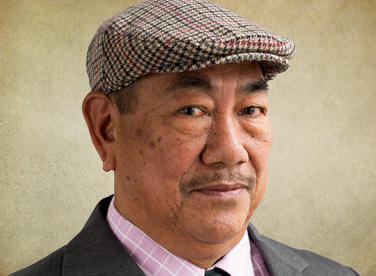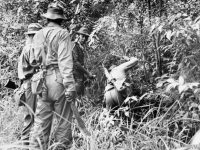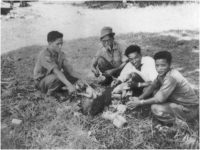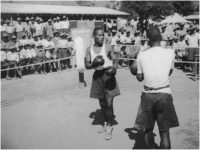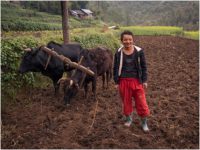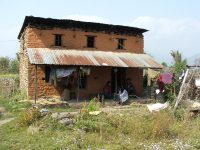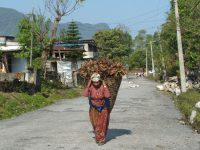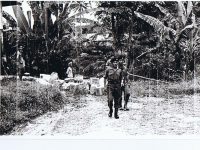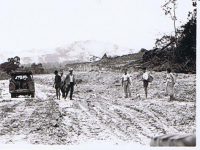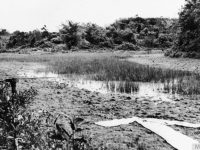Karna Bahadur Rana
Karna Bahadur Rana Corporal
(Portrait © Gurkha Voices Oral History Project)
-
Harsh jungle conditions
-
Jungle rations
-
Fitness training for Gurkha recruits
Originally born in India while his father was in the Indian Army, Karna and his mother moved back to their mountain village in Nepal to farm when he was around three years old. Karna saw active combat service in Malaysia during the 1960s and was ambushed four times. Karna’s story is recounted in our book, published later this year. Keep in touch via our blog: www.gurkhastories.wordpress.com
Karna features in our short film which can be viewed on our website by clicking on here.
Audio & transcripts using voice of interpreter are below:
-
Audio 1
-
Audio 2
Audio 1 (interpreter voiceover) 1 min 4 secs
After getting enlisted into the Gurkhas, the basic training that we did as a new recruit after coming to Malaysia was all about fighting battles: how to kill your enemy and how to survive. For that we must remember and was taught that fitness was very important before going to the battle. With fitness, one is able to survive and destroy the enemy and also save lives of our friends.
Camouflage and concealment; another important skill for a soldier. When we go to the jungle for battle, and if we don’t have proper camouflage and concealment, we cannot fight the battle properly. We cannot win against the enemy. We cannot kill the enemy. Instead the enemy will kill you. For that reason, the first important thing was fitness and training. After that we become brave. The training must be tough for a soldier to fight in the battle and to achieve bravery… to survive and to destroy your enemy.
For a split second your heart feels the pain, but as soon as the blood of that friend touches you, or it kind of sprays on you,… you get this strange sort of strength to kill the other side. It’s like: you killed my friend, I’m definitely going to kill you. …you become really, really …you get a lot of courage to kill the other side, like you don’t think of anything else after that.
You don’t have any power to think logically at that time, all you have is that adrenalin and the rush inside you to kill the other side.
-
Boy with plough (Photo: Earthducation MT Lab)
-
Village house (Photo: Sue James)
-
Daily work (Photo: Sue James)
-
Example of supply drop (Photo: Godwin family)
-
Border of Indonesia is the hills (Photo: Godwin family)
-
Directing air strikes
Audio 2 (interpreter voiceover) 1 min 40 secs
After a month, following intelligence, we went to attack again. This time round it was very difficult. The enemy almost had a company next to the river bank. We crossed the border and travelled without food for 4 days to go behind the enemy post and counter attacked with a success. In this incident, we had many losses on our side. I administered first aid to many of my fellow friends. Although I was a new recruit I carried my injured colleagues, especially the older ones to safety and performed field dressing.
We lost many of my colleagues here; one of my close friend, a senior to me, who was enlisted 2 years before me got shot and died on the battlefield. There were many losses from the enemy side as well. We found their weapon and ammunition dump and rigged it with time bombs to allow time for us to escape. The bomb went off as we crossed the border. We did not salvage anything and the two of us came back just carrying our gun. We then cooked and ate after coming back to our camp.
There are many small incidents: Enemy leaving their camps in a hurry, amidst preparing meals. Many caged animals. Did you know that chickens fainted while shooting took place? We found out many shocked chickens and domestic monkeys. We moved the monkey but it didn’t move at all. We looked at it closely but saw no wounds.
Interview Extract (based on interpreter's translation):
I was born in 1948 in India, but for army I had to make it 1945. My father was army, in the Indian army, and he fought in the Second World War.
My father didn’t talk in detail about things, but he used to tell me the places that he went to like India, Pakistan, Singapore, Afghanistan and apparently somewhere in Europe in the Second World War, but I don’t remember the country. He used to tell me about how he’s gone around the world and all these places, and he used to say, ‘You guys can’t do that! I did that much, you guys can never do that.’ My father felt proud of what he’d done.
My father would tell us stories of the food he used to eat in the army, and he said that the most they got to eat was in Thailand where they got double rations so he used to have a massive chicken to himself, which is the kind of size that four or five people would share at home.
My father was in the army for twenty years, and as he was abroad, it was just my mother and her children. When I was eight or nine, I had to do all the work on the field with the plough. I would have to do that all day because there was nobody else. Then at night time when I had to have dinner I would sleep while I was eating, literally just fall asleep. I had a very hard time until after my father came back from the army and then had his pension, but at the age of fifteen I entered into the army so I was kind of the eldest man in the house.
Even food was a shortage at home, I used to say, ‘Mum, I’m very hungry.’ and if there were any rotis she would give them to me, but if there wasn’t then she made a kind of rice out of sweetcorn; blend, grind it and just make something out of it, but it was very, very difficult to eat proper food.
In the villages there’s absolutely nothing called rest; we were constantly working 24/7 and the people in the village they don’t know what is rest and what is holiday. It’s just working, working cutting the grass to feeding the animals, it’s just that there’s no rest whatsoever.
[For fun there would be] singing and dancing. Without telling Mum and Dad, going away at night, come back in a morning, cutting the grass in the morning, play around till twelve or one o’clock in the hills, all with friends. We’d play with little stones and make up little games, playing cards. When there used to be a market in the village, together with friends we would split [our money] up, and then one would get the sweets, one would get the snacks, the other would get eggs etc. So put it altogether and we would be full!
My mother is ninety six now. She had a very hard life. She lived in India with my father for three years, but they moved around a lot… But my mother had such a hard time looking after all of us. I also had a little brother who passed away. She used to go looking for food from twelve in the afternoon till twelve at night. She used to come all of a sudden at midnight and make food for us and then do all the washing-up, everything around the house and for the animals, and I don’t know what time she fell asleep. All that day when she was out, we’d be sitting there waiting for her just in the corner [of the room] doing nothing or feeding grass to the animals, but the four of us would just be sitting in the corner waiting for mum to come back. If I tell you the whole story, it’s too long [shakes his head]. I can’t tell the whole story; even I can’t bring myself to do it.
Oral histories: © Gurkha Voices Oral History Project

